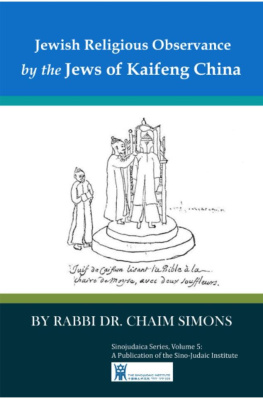


Copyright 2019 by Georgette Bennett
All rights reserved. No part of this book may be reproduced in any manner without the express written consent of the publisher, except in the case of brief excerpts in critical reviews or articles. All inquiries should be addressed to Skyhorse Publishing, 307 West 36th Street, 11th Floor, New York, NY 10018.
Skyhorse Publishing books may be purchased in bulk at special discounts for sales promotion, corporate gifts, fund-raising, or educational purposes. Special editions can also be created to specifications. For details, contact the Special Sales Department, Skyhorse Publishing, 307 West 36th Street, 11th Floor, New York, NY 10018 or .
Skyhorse and Skyhorse Publishing are registered trademarks of Skyhorse Publishing, Inc., a Delaware corporation.
Visit our website at www.skyhorsepublishing.com.
10 9 8 7 6 5 4 3 2 1
Library of Congress Cataloging-in-Publication Data is available on file.
Cover design by Brian Peterson
Cover photo credit Courtesy of The Jacob Rader Marcus Center of the American Jewish Archives, Cincinnati, Ohio at americanjewisharchives.org
ISBN: 978-1-5107-4539-1
Ebook ISBN 978-1-5107-4540-7
Printed in the United States of America
To Joshua-Marc Bennett Tanenbaum
That he may know the father he never met
Contents
This title is taken from A Prophet for Our Time: An Anthology of the Writings of Rabbi Marc H. Tanenbaum , Fordham University Press, 2002.
Preface
M ORE THAN A QUARTER CENTURY has passed since Rabbi Marc Tanenbaum died in 1992, but his legacy endures. Indeed, his remarkable life provides a roadmap for transcending these troubled times. Fascinating, featuring intimate encounters with the religious, political, and communal leaders who shaped our contemporary world, it is a guide for anyone seeking to live according to the principle of Tikkun Olam the Jewish imperative to fix what is broken in the world.
In his daily life, Rabbi Tanenbaum challenged the status quo, understanding that bringing about lasting change required tenacity and struggle. His actions were as bold and transformative as his words; he fought the good fight. His legacy lives on in the bridges he built, the conflicts he mediated, and the advances in human rights for which he fought. He played a historic role in the removal of systemic anti-Semitism from Catholic liturgy. He catalyzed Jews and evangelicals to overcome their mutual suspicion and find common ground. He made common cause with Muslims, Sikhs, and any others willing to join forces with him in pursuit of justice. He was active in the American civil rights struggle. He mobilized support for Vietnamese boat people, starving Biafrans, and anti-apartheid forces in South Africa. And he was a key player in liberating Soviet Jews.
His deep involvement in all of these game-changing undertakings was highly visible as they were unfolding over the course of Rabbi Tanenbaums career. As a result, he became widely known as the human rights rabbi, the foremost apostle to the gentiles, and the Secretary of State of the Jews.
Much has been written about Rabbi Tanenbaums work, but this is the first account to focus on his life in its entirety, presenting a multi-dimensional and holistic portrait of this iconic individual. Our goal in publishing this work is not merely to memorialize Marc Tanenbaum, but to enable the lessons of his leadership to inspire those who want to bring about lasting social and political change.
Many hands and minds shaped this work. Extensive research was conducted by Gerald Strober, who worked closely with Marc at the American Jewish Committee. Strober and his wife, Deborah, drew on extensive oral and written histories compiled by the AJC as well as numerous interviews they themselves conducted with many individuals who worked with Rabbi Tanenbaum in a variety of his causes. Most of the facts and stories, the tales and quotations, that form the corpus of this volume are drawn from those histories. This historical record was supplemented by the vast trove of material in the Tanenbaum collection at the American Jewish Archives in Cincinnati. In addition, the rabbis widow, Georgette Bennett, also gave generously of her time, not only by offering her recollections, but also by providing original source materials.
The text was further shaped and edited by Harvey Shapiro, an experienced writer with a keen understanding of the issues and themes animating the Jewish world and the American polity during Marc Tanenbaums distinguished career.
For more than a quarter century, the Tanenbaum Center for Interreligious Understanding, founded after the rabbis death by his widow, has worked to sustain and advance his objectives and aspirations. The Centers focus has not been on buffing its namesakes reputation, but on building upon his achievements.
Those who want to go beyond whats recounted in this book and learn more about Rabbi Tanenbaum and his work can visit The Rabbi Marc H. Tanenbaum Collection at the American Jewish Archives (https://fa.americanjewisharchives.org/tanenbaum/).
Introduction
We had no food and water. We began to drink the seawater and eat seaweed. Our children became deathly sick and feverish and we were certain that we would die. Rabbi, you as a Jew, will understand this better than most people. The worst thing of all was the awareness that we were abandoned by the world, that our lives meant absolutely nothing to anybodythat human life had become worthless.
Nguyen Than, one of thousands of Vietnamese boat people fleeing tyranny, describing his and his immediate familys ordeal to Rabbi Marc Tanenbaum
F EBRUARY 1978, S OUTHEAST A SIA . I T is a typically hot, humid day on the banks of the South China Sea. As jeering Indonesian officials massed on the shore to look on, a Westerner of patrician bearing in his early fifties plunges fully clothed into the choppy waters and swims toward a group of small boats adrift within sight of land.
The craft are overloaded with starving men, women, and children. Struggling against the strong current, their would-be rescuer grabs hold of one after another of the flimsy boats and pushes them with all his might toward the shoreand, he hopes, to safety.
This courageousand perhaps quixoticeffort is being undertaken by Rabbi Marc Tanenbaum, an expression of his sense of innate human decency and compassionand his embodiment of Leviticus 19:16: Thou shalt not stand by idly while the blood of your brother cries out from the earth. Tanenbaum is being taunted by the scoffing authorities. Not content with merely shouting down the frightened mass of humanity fighting for their very lives, the onlookers attempt to push the fragile boats back into the water.
But the rabbi does not desist. The director of the American Jewish Committees Department of Interreligious Affairs, Tanenbaum has journeyed many thousands of miles from his comfortable life in New York to participate in a two-week-long humanitarian mission to Southeast Asia organized by the International Rescue Committee. He is not one to stand by, immune to the human suffering before him.
Among those traveling with the rabbi are such luminaries as film and stage star Liv Ullmann, folksinger Joan Baez, former Soviet refusenik and Prisoner of Zion Alexander Ginzburg, civil rights activist Bayard Rustin, and Holocaust survivor and scholar Elie Wiesel. They are bearing witness and offering humanitarian assistance to refugees housed in camps throughout the region.
Next page












